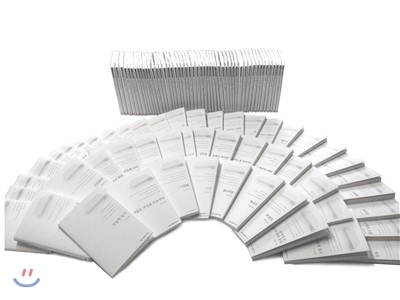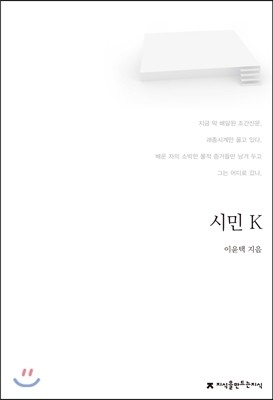Lee Yountaek (born 1952) is a poet, dramatist, and producer.
Life
Lee Yountaek was born in Busan. He studied at Seoul Institute of the Arts but quit in 1973 and returned to Busan, where he held odd jobs as a door-to-door salesman, post office clerk, and technician at a textile factory. Lee made his literary debut in 1979 when his poems "Cheonchesueop" (천체수업 Astronomy Lesson) and "Dokkaebibul" (도깨비불 Ghost Lights) were published in Hyundae Poetry. In 1979 he began working for the Busan Ilbo as a journalist, while continuing to write poetry and criticism in literary magazines. In 1986 he quit his job at the Busan Ilbo and founded the theatrical company Yeonhuidan Georipae and opened the Gamagol Theater in Busan.
Up to 1993, Yeonhuidan Georipae staged plays mostly at the Gamagol Theater in Busan before branching out to Seoul, with Lee at the forefront of Korea's theater scene. Lee became a tour de force, writing not only for the stage but for film and television as well. He also wrote newspaper columns and tried his hand at dance and musical stagings, earning the nickname of "culture guerrilla." In February 2018, Lee was accused by former members of Yeonhuidan Georipae of sexual harassment and rape, upon which the company was dismantled. In September the same year he was sentenced to six years in prison. In July 2019 he lost his appeal and was ordered to serve seven years in prison.
Writing
As director of Yeonhuidan Georipae, Lee Yountaek swept theatrical awards for his plays such as Simin K (시민K Citizen K), Ogu: jugeumui hyeongsik (오구: 죽음의 형식 Ogu: Rituals of Death), and Babo gaksi (바보각시 Foolish Bride). After successfully staging Simin K at Seoul's Daehakro 1988, he began to split his time between Seoul and Busan, directing. In 1995 he won the Dong-a Drama Awards' grand prix and best script for Munjejeok ingan yeonsan (문제적 인간 연산 Yeonsan, Troubled Human). His works successfully combined popular appeal with tradition, and were invited to many international drama festivals.
Lee Yountaek has consistently explored the topics of home, mothers, and longing for lost things while exploring the form of traditional Korean theater. Inspired by the Ogu shamanistic ritual, Ogu: jugeumui hyeongsik takes the ritual's rites and playful elements and gives them a modern reinterpretation. The themes touched upon are Korea's traditional conceptions of death and the afterworld. In five acts, featuring an agent from the afterworld, the dead mother, and the bereaved, the play moves back and forth between the worlds of the living and the dead, showing that life and death coexist in the human world and that death is never far away from our lives. The Ogu ritual, which prays for the dead to be comfortable in the afterlife, reminds us of the traditional view of death not as an eternal parting, and that the afterworld and the living world are connected.
Eomeoni (어머니 Mother) depicts memories and longing for that most fundamental refuge of humanity, the mother figure. In an industrialized society, a mother reminisces about her past life to a grandson. The work moves easily from dream to reality, the living and the dead, in a space where the boundaries between the afterworld and the living world have broken down, as the mother's trauma is overcome and her life made whole again.
Lee Yuntaek ha demostrado su talento en muchas ocasiones a través de la producción de guiones de películas y de series de televisión, así como puestas en escena de musicales y obras teatrales para eventos internacionales. No solo es capaz de usar una gran gama de formas artísticas, sino que también siempre agrega algo nuevo y experimental en cada proyecto que realiza. Le da un sentimiento coreano y un humor único a sus formas artísticas, por eso se lo conoce con el apodo de "guerrillero cultural".4
Aunque sus temas normalmente contienen algo oscuro y serio, sus obras rebosan de una vibrante energía. Investigan y contemplan las vidas humanas que avanzan lentamente hacia su fin. Incluso después de una afable sonrisa, la audiencia siempre se queda con algo que reflexionar.5
Ha sido director en el Teatro Nacional, donde ha dirigido la versión musical de La tempestad de Shakespeare en 1999. Su producción de un musical titulado Soñando en Hwaseong (Hwaseong-eseo ggum ggunda), representado en sitios que son patrimonios culturales,6 es una de sus muchas experimentacioens teatrales.
Ha producido las siguientes películas:7
2003 Ogu (guionista y director)
1997 Model (TV Series)
1991 Seoul Evita
1990 Solo porque eres mujer (Danji geudaega yeojaraneun iyumaneuro)
L'Institut coréen de traduction littéraire (LTI of Korea) résume son œuvre de cette manière :
Lee Yountaek a fait montre de ses talents à plusieurs reprises par la production de scénarios de films, de téléfilms, de spectacles de danse, de comédies musicales, et de pièces de théâtre pour des événements internationaux. Son répertoire couvre un large éventail de formes artistiques, mais il apporte aussi quelque chose de nouveau et d'expérimental dans chacun de ses projets. Il injecte dans ses créations un sentiment typiquement coréen et beaucoup d'humour ; il est à ce titre largement reconnu comme un « guérillero de la culture »4.
Bien que ses thèmes contiennent généralement des éléments sombres, ses écrits regorgent d'une grande énergie. Même après un éclat de rire, l'auteur incite souvent l'audience à la plus grande réflexion4.
Récemment, il a été davantage actif en tant que directeur du Théâtre national de Séoul, où il a notamment dirigé une version musicale de La tempête de Shakespeare en 1999. Sa comédie musicale Rêve à Hwaseong (Hwaseong-eseo kkum kkunda) produite dans des sites classés appartenant au patrimoine culturel, est un de ses pièces les plus connues4.
1986年、釜山に演戯団ペゴリ(連中)という劇団を作り、ソウルではない地方で公演をした。 李潤澤の作品の特徴は、詩的なセリフにある。ここで詩的な言語とは、ジャーナリズムの言語に反する言葉であると彼は言う。
彼は、演劇的な形式に拘らず、実験的な作品も数多く書いた。その中でも、굿(グッ:悪鬼払いのための行う儀式、シャーマニズム)を韓国的な演戱の伝統と見做して、ここから演劇の原型を見つけ出そうとする。内容の面では、人生の短い断面よりは人生全体を観望できるスケールの大きい作品のほうが多い。
이윤택(1952~)은 대한민국의 극작가이며 연극연출가다.
생애
이윤택은 1952년 부산에서 태어났다. 1952년 부산에서 태어나 서울연극학교(현 서울예술대학)를 중퇴하고, 방송통신대 초등교육과를 독학으로 졸업했다. 1979년 〈천체수업〉, 〈도깨비불〉 등을 《현대시》에 발표하면서 시인으로 등단했다. 1979년 《부산일보》사 편집부에 입사하여 신문기자 생활을 했다. 그리고 1980년 《열린시》, 무크지 《지평》의 동인으로 시와 비평 활동을 병행했다. 이후 1986년 《부산일보》사 기자를 그만두고 ‘연희단거리패’와 ‘가마골소극장’을 창단하였다. ‘연희단거리패’는 1993년까지는 부산 광복동과 중앙동의 ‘가마골소극장’을 중심으 로 활동하다가, 1993년부터 1999년까지 서울에서 ‘우리극연구소’와 함께 공연 활동을 했다. 이윤택은 극작, 연출, 연기훈련, 무대 기술 전반에 걸친 광범위한 작업을 통해 1990년대 한국 실험연극에 앞장서 왔다. 또 시나리오·TV 드라마·신문 칼럼 집필은 물론 무용·이벤트 연출도 겸하면서 '문화 게릴라'로 불리기도 했다.
이윤택은 2018년 2월 극단 연희단거리패의 여성 단원들로부터 성추행, 성폭행 고발을 당해 파문이 일었다. 이윤택은 이러한 사실을 인정하고 모든 활동을 중단하기로 결정했으며, 이와 같은 사실이 밝혀지면서 극단 연희단거리패도 해체되었다. 2018년 9월 징역 6년을 선고받았고, 2019년 7월 유죄가 확정되었다.
작품 세계
이윤택은 전통적인 연극의 형식에 대한 탐구, 고향, 어머니, 잃어버린 것에 대한 그리움에 지속적으로 관심을 갖고 작품으로 표현해왔다.
희곡 《오구 : 죽음의 형식》(1989)은 ‘오구굿’에서 모티프를 빌어 창작한 작품으로, 작가는 굿의 특성인 제의와 놀이의 형식을 현대적으로 재창조했다. 이 작품은 ‘굿’이라는 놀이를 통해 한국의 전통적인 죽음 의식과 사후 세계에 대한 인간의 상상력을 형상화했다. 총 5장으로 구성된 희곡으로, 저승사자와 죽은 노모, 상주가 등장하여 이승과 저승의 경계를 오가며, 인간에게 삶과 죽음이 공존하며, 죽음이 멀리 있지 않다는 것을 보여준다. 작가는 망자가 사후 세계에서 잘 살 수 있기를 기원하는 오구굿의 전통을 통해 죽음이 영원한 이별이 아니고, 이승과 저승을 구분하지 않는 전통적인 죽음에 관한 태도를 강조한다. 전통 연희의 특징을 자연스럽게 현대화시킨 《오구 : 죽음의 형식》는 굿의 의식과 장례 절차 등을 재현했다.
희곡 《어머니》(1999)는 인류의 본향인 어머니에 대한 기억과 회한을 그린 작품이다. 본격화된 산업사회에서 어머니가 손자에게 지나온 삶을 회상하듯 들려주는 방식으로 그려진다. 작품은 꿈과 현실을 넘나들고 산자와 죽은 자의 어우러지며, 이승과 저승의 경계가 허물어진 복합적 구조 속에서 어머니의 상처가 치유되고 삶이 통합되는 과정을 보여준다.
주요 작품
1) 희곡집
《오구》, 공간, 1994.
《어머니》, 평민사, 1999.
《살아있는 동안은 날마다 축제》, 샘터, 1999.
2) 연출
〈죽음의 푸가〉, 1986.
〈시민K〉, 1989.
〈청부〉, 1990.
〈오구〉, 1990.
〈길 떠나는 가족〉, 1991.
〈문제적 인간-연산〉, 1995.
〈파우스트〉, 1996.
〈느낌, 극락같은〉, 1998.
〈햄릿〉, 2001.
3) 시나리오
《우리는 지금 제네바로 간다》, 1986.
《오세암》, 1990.
《낙타는 따로 울지 않는다》, 1990.
《단지 그대가 여자라는 이유만으로》, 1991.
《장군의 아들 2》, 1991.
《바보각시》, 1999.
《오구》, 2000.
4) 시집
《춤꾼 이야기》, 민음사, 1986.
《우리는 지금 제네바로 간다》, 문학사상사, 1988.
《막연한 기대와 몽상에 대한 반역》, 세계사, 1998.
《나는 차라리 황야이고 싶다》, 북인, 2007.
《숲으로 간다》, 현대서정사, 2016.
5) 수상 내역
1986년 제26회 대종상 각본상
1989년 한국평론가협회 최우수예술가상
1991년 동아연극상 작품상. 연출상
1991년 서울연극제 대상
2002년 대한민국 문화예술상 수상
2005년 동아연극상 희곡상
2006년 대한민국 뮤지컬 대상 연출상
2007년 동아연극상 작품상,연출상
2007년 더 뮤지컬 어워드 최우수작품상
2008년 대한민국연극대상 작품상
2009년 동아연극상 대상 연출상
2010년 동아연극상 무대미술상





